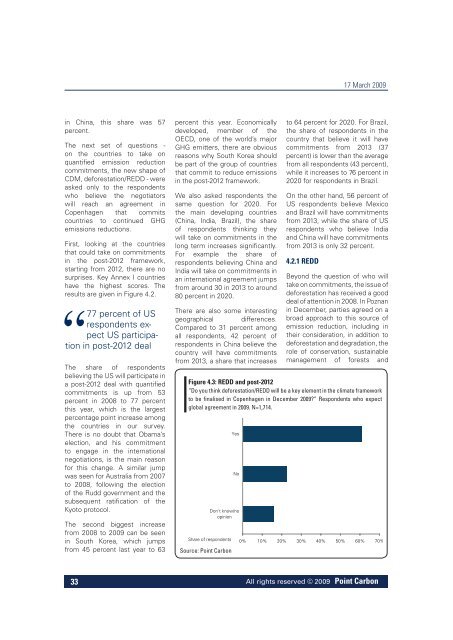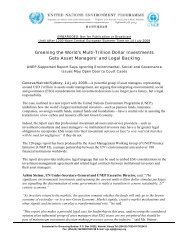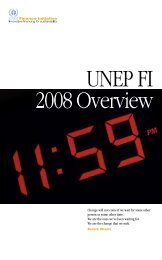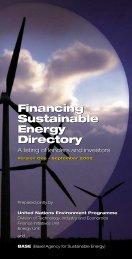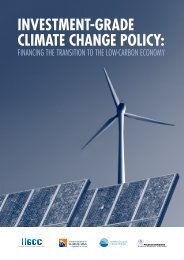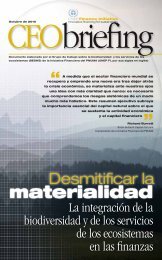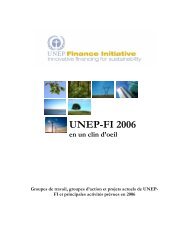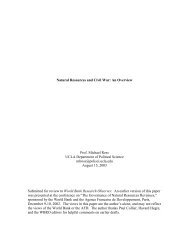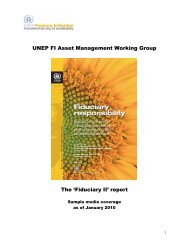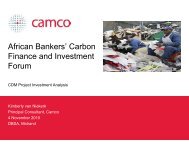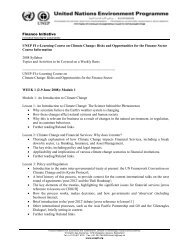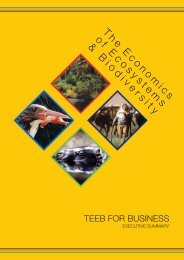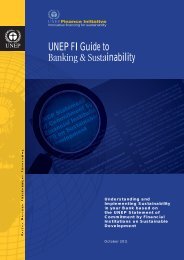Carbon 2009 Emission trading coming home - UNEP Finance Initiative
Carbon 2009 Emission trading coming home - UNEP Finance Initiative
Carbon 2009 Emission trading coming home - UNEP Finance Initiative
You also want an ePaper? Increase the reach of your titles
YUMPU automatically turns print PDFs into web optimized ePapers that Google loves.
17 March <strong>2009</strong><br />
in China, this share was 57<br />
percent.<br />
The next set of questions -<br />
on the countries to take on<br />
quantified emission reduction<br />
commitments, the new shape of<br />
CDM, deforestation/REDD - were<br />
asked only to the respondents<br />
who believe the negotiators<br />
will reach an agreement in<br />
Copenhagen that commits<br />
countries to continued GHG<br />
emissions reductions.<br />
First, looking at the countries<br />
that could take on commitments<br />
in the post-2012 framework,<br />
starting from 2012, there are no<br />
surprises. Key Annex I countries<br />
have the highest scores. The<br />
results are given in Figure 4.2.<br />
77 percent of US<br />
respondents expect<br />
US participation<br />
in post-2012 deal<br />
The share of respondents<br />
believing the US will participate in<br />
a post-2012 deal with quantified<br />
commitments is up from 53<br />
percent in 2008 to 77 percent<br />
this year, which is the largest<br />
percentage point increase among<br />
the countries in our survey.<br />
There is no doubt that Obama’s<br />
election, and his commitment<br />
to engage in the international<br />
negotiations, is the main reason<br />
for this change. A similar jump<br />
was seen for Australia from 2007<br />
to 2008, following the election<br />
of the Rudd government and the<br />
subsequent ratification of the<br />
Kyoto protocol.<br />
The second biggest increase<br />
from 2008 to <strong>2009</strong> can be seen<br />
in South Korea, which jumps<br />
from 45 percent last year to 63<br />
percent this year. Economically<br />
developed, member of the<br />
OECD, one of the world’s major<br />
GHG emitters, there are obvious<br />
reasons why South Korea should<br />
be part of the group of countries<br />
that commit to reduce emissions<br />
in the post-2012 framework.<br />
We also asked respondents the<br />
same question for 2020. For<br />
the main developing countries<br />
(China, India, Brazil), the share<br />
of respondents thinking they<br />
will take on commitments in the<br />
long term increases significantly.<br />
For example the share of<br />
respondents believing China and<br />
India will take on commitments in<br />
an international agreement jumps<br />
from around 30 in 2013 to around<br />
80 percent in 2020.<br />
There are also some interesting<br />
geographical differences.<br />
Compared to 31 percent among<br />
all respondents, 42 percent of<br />
respondents in China believe the<br />
country will have commitments<br />
from 2013, a share that increases<br />
to 64 percent for 2020. For Brazil,<br />
the share of respondents in the<br />
country that believe it will have<br />
commitments from 2013 (37<br />
percent) is lower than the average<br />
from all respondents (43 percent),<br />
while it increases to 76 percent in<br />
2020 for respondents in Brazil.<br />
On the other hand, 56 percent of<br />
US respondents believe Mexico<br />
and Brazil will have commitments<br />
from 2013, while the share of US<br />
respondents who believe India<br />
and China will have commitments<br />
from 2013 is only 32 percent.<br />
4.2.1 REDD<br />
Beyond the question of who will<br />
take on commitments, the issue of<br />
deforestation has received a good<br />
deal of attention in 2008. In Poznan<br />
in December, parties agreed on a<br />
broad approach to this source of<br />
emission reduction, including in<br />
their consideration, in addition to<br />
deforestation and degradation, the<br />
role of conservation, sustainable<br />
management of forests and<br />
Figure 4.3: REDD and post-2012<br />
“Do you think deforestation/REDD will be a key element in the climate framework<br />
to be finalised in Copenhagen in December <strong>2009</strong>?” Respondents who expect<br />
global agreement in <strong>2009</strong>. N=1,714.<br />
Don't know/no<br />
opinion<br />
Share of respondents<br />
Source: Point <strong>Carbon</strong><br />
Yes<br />
No<br />
0% 10% 20% 30% 40% 50% 60% 70%<br />
33<br />
All rights reserved © <strong>2009</strong> Point <strong>Carbon</strong>


